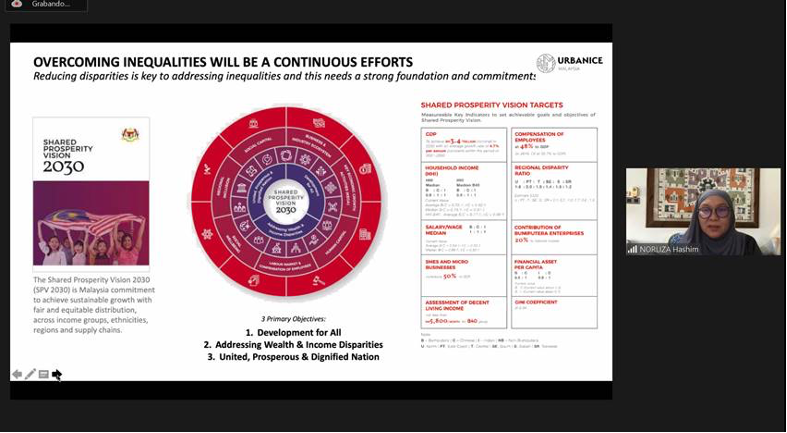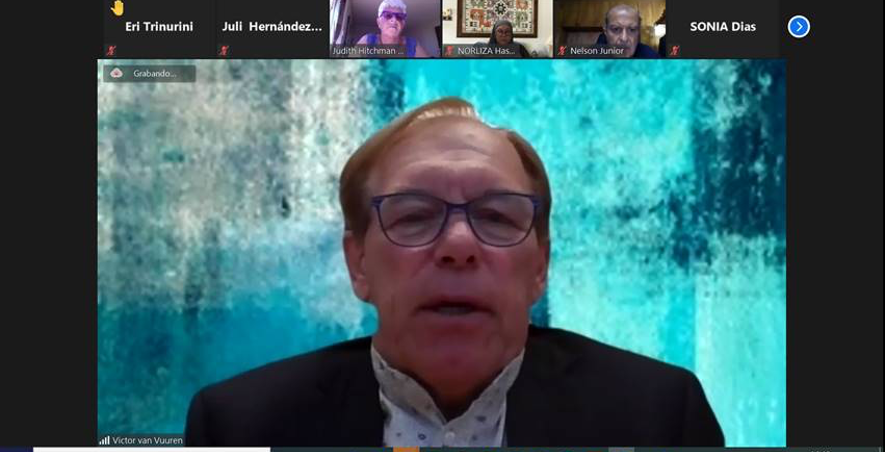RIPESS co-organised the event “Overcoming inequalities through the COVID-19 recovery: proposals from the Social and Solidarity Economy and the Right to the City”, together with the the Global Platform for the Right to the City and Urgenci, as an official side event to the UN High Level Political Forum.
The objective was to demonstrate some of the diversity of Social Solidarity Economy’s potential for overcoming the increased inequalities that have been caused by Covid-19, and the resilient pathways towards recovery in cities and in terms of urban-rural linkages.
It brought together around 70 participants representing a wide and important diversity of actors (local, regional and national governments, civil society organizations, international organizations, academia) who represented a clear commitment to SDG17 and cross-cutting partnerships. The panellists and interventions from the floor also represented all continents apart from Oceania. It focused on presenting concrete examples of the possibilities presented by Social and Solidarity Economy (SSE) to contribute to reducing inequalities in various fields, and how they have preserved and rebuilt communities throughout the COVID-19 pandemic.
This is a clear illustration of SDG1. The discussion highlighted concrete examples from multiple domains (informal work, housing, food production and consumption, basic services and others) from a solidarity-based perspective and under the framework of advancing the implementation of the 2030 Agenda. These examples illustrated SDG2, SDG8 and SDG11 in many different ways. The essential aspect was the fact that a vicious circle of loss of informal and formal employment leads to loss of other essential human rights (right to food, right to health, right to housing…) whereas women’s and other community-based cooperatives and collectives of various kinds formalise essential services that uphold these rights. These rights also emphasized the need for Social Security protection and a food safety net for all, based on healthy, nutritious local and territorial markets. The role of local and other levels of government is also key to supporting the vulnerable.
The panel was moderated by RIPESS’s joint coordinator and URGENCI’s President, Judith Hitchman, it the overarching logic of the interventions highlighted the need for a paradigm shift from the current mainstream economic development and growth models to achieve the Sustainable Development Goals (SDGs) and advance towards more just, equitable and sustainable communities that respect human rights.
SSE is currently playing a critical role in addressing and mitigating the short- and long-term impacts of the COVID-19 that can significantly contribute to such a paradigm change. In the short term, SSE actors have collective solutions that strengthen public services and complement government action. In the long run, SSE provides economic alternatives, promotes inclusive and sustainable models, and strengthen access to many human rights. These aspects were recognised by the UN Secretary General in his address to the UN Commission for Social Development in February 2021. He stated that “Social Solidarity Economy embodies another model that seeks a new balance between economic efficiency and environmental resilience”.
All these aspects were clearly set out by Nelson Saule, the joint co-ordinator of the Global Platform for the Right to the City in his introduction to the side event.
The first panellist was Sonia Diaz from Women in Informal Employment: Globalizing and Organizing (WIEGO), who focused her intervention on cooperatives as a pathway to dignity, revealing WIEGO’s actions with Informal Waste Pickers in Brazil. COVID19 has brought about devastating impacts on the lives of informal workers, who can find a pathway to dignified decent work through coops. Governments need to ensure that informal workers’ issues are addressed, sharing information and advocacy tools, and advocating for policies and plans that include informal workers.
She was followed by Simel Esim, a feminist economist who leads the International labour Organization (ILO)Cooperative Division highlighted a relevant example of these solutions: women-only cooperatives formed in the informal economy in sectors such as home-based workers, and domestic workers. She shared some emerging models for reaching scale and sustainability (consortia among social coops, franchising among domestic worker coops) and the relevance of macro levels (enabling environments) and meso levels (building supportive ecosystems) to ensuring the survival and growth of women collective enterprises in informal economy.
These two interventions were followed by that of André Luzzi fro Habitat International Coalition (HIC) and representative of the Urban Poor in the Coordination Committee of the Civil Society and Indigenous Peoples Mechanism of the UN Committee on World Food Security and Nutrition, who gave several different illustrations of how urban-rural linkages between small-scale food producers had helped feed vulnerable communities in cities during the pandemic through various kinds of solidarity-based initiatives and Community-Supported Agriculture. The link between health and fresh agroecological produce is an important factor. He emphasized the need to protect peri-urban small-scale food producers and agroecological farmers from industrial agriculture in terms of the right to adequate food and nutrition.
This first panel was followed by several interventions from the floor that highlighted additional aspects from different perspectives.
Ms. Norliza Hasim, from Urbanise Malaysia, opened the second panel. She described their work in supporting the Malaysian Ministry of Housing and Local Government in their efforts to generate integrated sustainable urban solutions that cover provision of housing and many other services that she shared with the participants in the event, clearly demonstrating through these examples how the links between right to housing and other rights are part of a long-term recovery from the pandemic.
Vic Van Vuuren, who leads the United Nations Inter-agency Task Force on Social and Solidarity Economy UNTFSSE was the final speaker. He focused his intervention on the importance of strengthening international recognition for SSE in contributing to the 2030 Agenda and the SDGs. He particularly emphasized how multi stakeholder partnerships such as these are key to creating innovative policies for a much-needed transformation of our economy at different levels, including in local communities. He called for a people and planet-centred recovery, and highlighted the key role SSE can play. The fact that SSE will be a central issue that will be addressed at the next ILO Conference in 2022 is a significant development that will boost recognition that another economic paradigm is possible and that the solutions already exist.
The session ended with a second series of interventions from the participants and closing remarks from Nelson Saule and Judith Hitchman, who emphasized the wealth of good practice and existing solutions to move forward to a more inclusive and resilient rights-based society for all.
To view the full recording of the side event, click here.





Leave A Comment